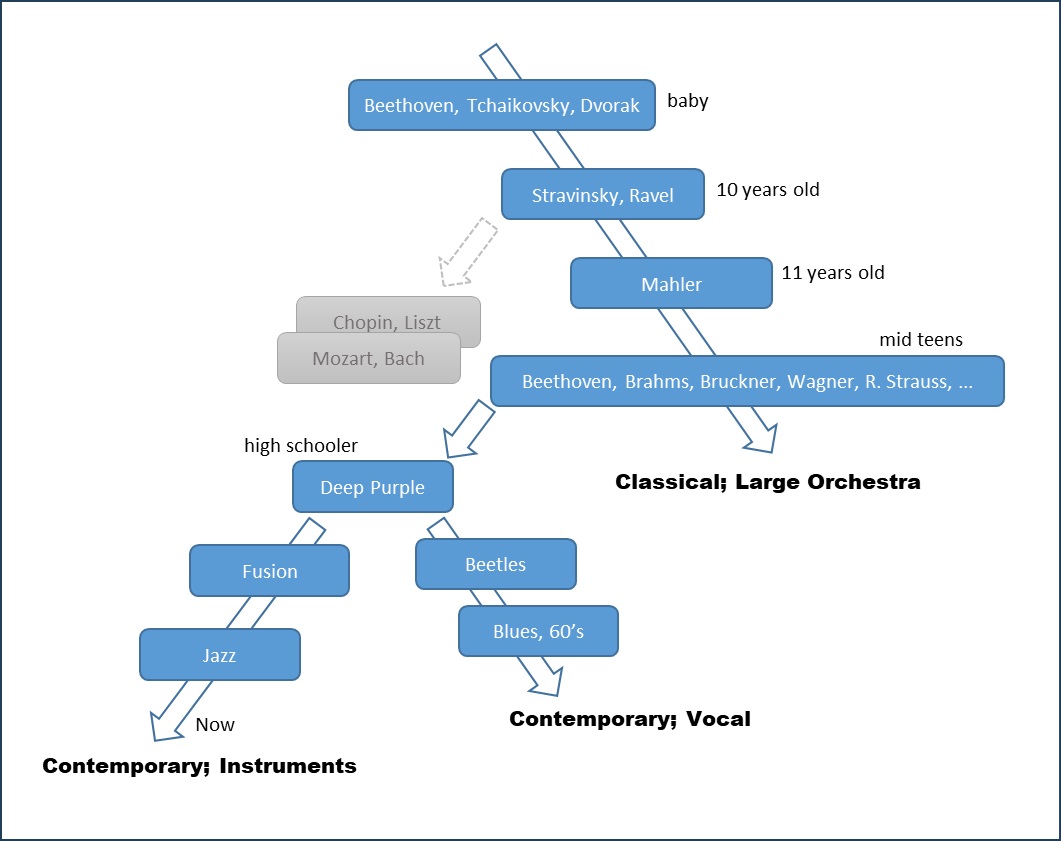Listening History – 1
Sep. 1, 2024
My love of music dates back to when I was in my mother’s womb and my father was listening to LPs of Beethoven, Tchaikovsky, Dvorak, and others. Writing about my musical history is just a monologue, but it’s a rare chance to look back on it, so I’m going to write about my journey from the beginning to the present. If the long text bores you, just look at the picture below and turn back.

When I was in my mother’s womb, I did not listen of my own will. But I heard that when I was a baby, I was already begging my father to play Beethoven’s Symphony No. 5 and Tchaikovsky’s Swan Lake. However, I think that was more about wanting to listen to familiar songs as background music, rather than understanding the music.
I started concentrating on music when I was 10 years old. It all started with Stravinsky’s “The Firebird” and Ravel’s “Bolero.” It was a new sound I had never heard before. And it was music with a story. When I closed my eyes and listened, various scenes came to mind, and my whole mind was drawn into the music.
And after that I got to know Mahler. This encounter was decisive for my musical life. The melody that is like the essence of the beauty of the world, the sudden sinking spirit, and the intense conflict between them. My young heart was grabbed with both hands and shook violently, and tears overflowed.
At that time, there were not many conductors who conducted Mahler’s symphonies. Most of what I listened to were old recordings conducted by Bruno Walter, a direct disciple of Mahler. However, Leonard Bernstein, one of the few conductors who conducted Mahler, came to Tokyo in 1974. I was 13 years old at the time. I begged my parents to buy me a ticket. And it was the seat in the center of the second row of the second floor. I’m surprised they bought me such a seat. I can listen to the whole orchestra as if it were my own! I sat up, leaning forward in my seat so as not to miss a single note, and waited.
The program was Mahler’s 5th Symphony. A gloomy fanfare followed by the sudden attack of the whole orchestra. I experienced the true power of the New York Philharmonic’s large orchestra, and my whole body was immersed in Mahler’s symphony.
After the performance, there was a line at the back of the hall, and I got to know that I could get Bernstein’s autograph. When it was my turn, I remember him looking at me as if to say, “Such a young boy came alone to listen to this symphony!”
I listened to almost all of Mahler’s music repeatedly, recording it on FM radio and buying LPs myself with my allowance. In the process, I think I learned how to listen to complex orchestral music. Then I wanted to listen to Beethoven, Tchaikovsky, and Dvorak again, which I had heard when I was a baby. I also expanded my range of composers to Brahms, Bruckner, Wagner, Richard Strauss, etc., and listened to a lot.
Looking back, I think that this trend was the large orchestral music of German orthodoxy. That suited my young mind. On the other hand, I did not, and still do not, listen much to Chopin, Liszt, Bach, or Mozart, which are popular in Japan. It is a matter of preference.
These were my experiences listening to music up until I was about 17 years old. After this, my tastes expanded to include music other than classical music, but I still could not experience those intense emotions that bring tears to my eyes, or the experience of listening with all my heart and soul concentrated, from any other music.
However, it’s unfortunate that just because I listen to that kind of art doesn’t mean that I can create it myself.
to be continued.